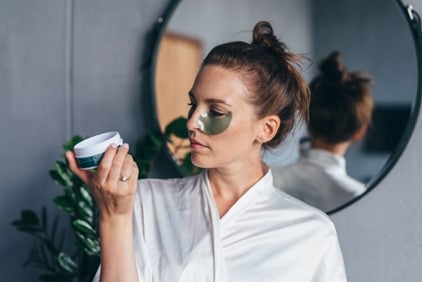
Clean Skincare versus Certified Organic: Understanding the Difference
Share
In the world of skincare, terms like “clean beauty” and “certified organic beauty” have gained a significant amount of attention lately. But what do these words even mean? And what exactly is the difference between them? By understanding these differences, customers are able to make more informed choices about the products incorporated into their skincare routine.
Defining Clean Beauty
Transparency within the beauty and skincare industry is held to a high regard. While a brand may provide assurance that their products are clean, or rather free of any synthetic materials that may cause harm, the clean beauty industry lacks a standardized system. With no fixed definition on what clean beauty is, it may vary depending on the brand, making it increasingly challenging to determine the level of ingredient scrutiny and transparency.
Clean beauty itself relies on the concept of harmful ingredient exclusion, but the decision of what constitutes an ingredient as “clean,” is vague. There are many widely known terms of ingredients to avoid, such as parabens and sulfates, which if absorbed in large amounts can over time affect the endocrine system. With more education, consumers are now reading labels more carefully to avoid such ingredients.
While this is a strong start, the consumer should know that even though the product may not contain parabens, there is a chance that it contains other additives, just as harmful, which are not technically required to be listed. Therefore, without a regulated framework, the exclusion of potentially harmful ingredients in clean beauty products may vary, with no external verification process to confirm the claims made by the brand.
All this being known, it’s smart to research products before purchasing!

Certified Organic Beauty
A consumer can choose an organically certified product knowing the authenticity of its organic claims, sustainability practices, and absence of synthetic chemicals. There is a strict set of standards and regulations which are recognized by certifying bodies, like the COSMOS in Europe, to ensure that the specifications of a company are accurate. While ensuring the benefits of these products, organic certifications often also prioritize environmental sustainability and biodiversity.
Laurus Organics is committed to providing the utmost quality of certified organic beauty through COSMOS, guaranteeing safe skincare products for all.

Overlapping Concepts: Clean Ingredients in Certified Organic Beauty.
So what exactly are the benefits of using an organic certification body like COSMOS? Organic certification provides an ingredient standard, verified and confirmed by the certifying bodies. COSMOS verifies that the ingredients used are free from synthetic chemicals, pesticides, and GMO’s. “Clean” beauty alone is not able to provide the exact same reassurance to the customer, depending on what the definition of “clean” is among varying brands.
Certified organic products undergo rigorous third-party certification processes involving ingredient sourcing and manufacturing practices. This only adds to the authenticity of a company’s claim to ethically and organically source their products. This integrity, however, cannot be established by clean beauty brands to the same degree, relying on internal brand guidelines or self-declared claims.

Certified Organic Beauty Benefits
1. Nourish the Skin
Certified organic ingredients provide the body exposure to rich vitamins, antioxidants and essential fatty acids. All of these ingredients are important when nourishing and supporting the health of your skin, providing hydration, and enhancing overall skin tone and texture.
2. Minimizing Skin Irritation
For individuals that struggle with sensitive or reactive skin, the use of organic certification products will be useful as they are typically formulated with gentle, non-irritating ingredients made from nature. With less exposure to common skin irritants, such as synthetic fragrances and harsh preservatives, organic products will feel soothing and help with healing long term.
3. Long-term Wellbeing
With little to no exposure to synthetic chemicals throughout your skincare routines, you are reducing your exposure to potentially harmful substances in the long run. By prioritizing organically certified skincare, you are making a conscious choice to support your overall well-being, both in terms of immediate skin health and in minimizing potential long-term health risks associated with synthetic ingredients.
Laurus Organics’ co-founders believe that “What goes ON the skin, goes IN,” furthering the importance of nourishing your body in every way possible.
Clean beauty and certified organic beauty are two distinct yet interconnected concepts within the skincare and beauty industry. While clean beauty promotes product safety and environmental awareness through harmful ingredient elimination, certified organic beauty goes further by ensuring that ingredients are cultivated and processed without synthetic chemicals.
By learning the differences between these two approaches, one can make more transparent and informed choices that contribute to a healthier, more sustainable beauty routine. Laurus Organics strives to be the provider of these organically certified products in order to support a healthy lifestyle for you and your family! #FromLaurusForAll.
